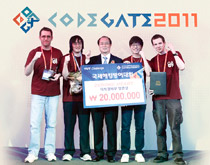In the Grand Ballroom of the COEX center in downtown Seoul, Korea, eight four-man hacker teams are huddled over their laptops. Some type furiously, brows furrowed. Others catnap before a final burst of problem-solving. They’ve been in the room for more than 20 hours. Projected above them, the scoreboard tells the story: a column of jang-jak yut (wooden sticks thrown in the traditional Korean game of yut) reports the scores. Each stick bears a team name. The first stick reads “PPP_CMU.”

The Plaid Parliament of Pwning, Carnegie Mellon’s entry in the Codegate hacker conference’s Capture the Flag competition, is clearly the team to beat, with fresh victories in other competitions, and a team boasting skills that seem lifted from the pages of a spy thriller: binary exploitation, cryptanalysis, lock picking, reverse engineering, and wireless protocol attack. Teams from Korea, Japan, the United States, and Sweden, some affiliated with universities, others with industry, and others with no affiliation at all, have beaten all comers to qualify to compete here, solving a slate of insanely difficult computer security problems for points, vying to prove themselves the most “1337” (that’s “elite” in hackerese) and bring home a prize of 20 million Korean won (about $18,500).
Although their lead appears comfortable, the Plaid Parliament doesn’t rest easy. At about 9 AM, an hour before the competition’s conclusion, the frontrunners “pwn” (solve) another brain-teaser that gives them an insurmountable lead. At 10 AM, the scoring server shuts out new entries, and the Plaid Parliament victory is official.
— William Abernaathy



